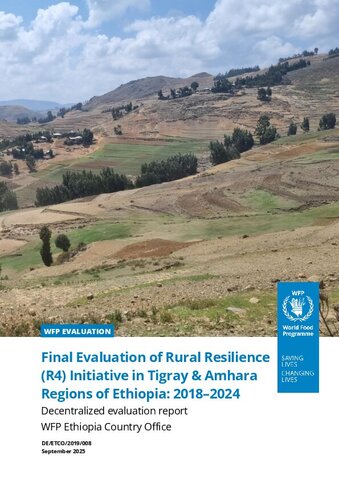
The R4 Initiative aims to build climate resilience among food-insecure households through four integrated risk management pillars: risk reduction, risk transfer (insurance), prudent risk-taking (credit), and risk reserves (savings). The programme was implemented in alignment with Ethiopia’s Productive Safety Net Programme (PSNP) and broader national climate adaptation strategies.
Evaluation methodology and limitations
The evaluation applied a theory-based framework and triangulated qualitative and quantitative data. Limitations included restricted access to some areas due to insecurity, and challenges in capturing long-term outcomes. Ethical considerations were prioritized, including informed consent and safeguarding protocols.
Evaluation findings
Alignment with needs and national priorities
R4 activities were found to be largely relevant to community needs and national priorities. Beneficiaries appreciated the programme’s focus on resilience and food security. However, targeting inconsistencies and timing issues occasionally undermined effectiveness.
Performance and results
The initiative achieved several intended outcomes, including increased access to microinsurance, improved agricultural practices, and enhanced household savings. Yet, implementation delays, limited financial literacy, and coordination gaps affected consistency and depth of results.
Resource utilization and efficiency
WFP generally managed resources efficiently, leveraging partnerships and cost-sharing mechanisms. Nonetheless, procurement delays and overlapping roles among stakeholders introduced inefficiencies. The evaluation recommends clearer operational protocols and streamlined coordination.
Community-level changes
Positive shifts were observed in resilience capacities, such as diversified livelihoods, improved coping strategies, and strengthened social cohesion. These changes were more evident in areas with sustained engagement and complementary programming.
Sustainability
Sustainability prospects are cautiously optimistic. While community ownership and institutional linkages have improved, long-term viability depends on continued government buy-in, capacity strengthening, and financial inclusion. Exit strategies and integration with national systems are critical.
Conclusions, lessons, and recommendations
Conclusions
The R4 Initiative is a promising model for climate resilience and risk-informed programming. It demonstrated relevance and partial effectiveness, with room for improvement in coordination and adaptive management.
Lessons learned
Key lessons include the importance of inclusive targeting, adaptive design, robust partnerships, and financial literacy. Sustained engagement and integration with national systems enhance impact.
Recommendations
Recommendations urge WFP and partners to:
- Refine coordination mechanisms and operational clarity;
- Invest in financial literacy and community capacity;
- Embed resilience-building within broader social protection frameworks;
- Develop clear exit strategies and sustainability plans.
